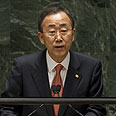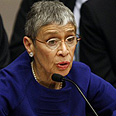
'Counter-productive.' Ban
Photo: AFP

'Not peace activists.' Shalev
Photo: Reuters
UN chief Ban Ki-moon demanded Wednesday that Israel lift its blockade of the Gaza Strip immediately in the wake of its deadly raid on a Gaza-bound aid flotilla.
Speaking on his return from visits to Brazil, Malawi and Uganda, Ban told reporters that the underlying problem behind Monday's tragedy was the long-running, crippling Israeli siege of the tiny Palestinian coastal enclave, which he described as "counter-productive, unsustainable and wrong."
US Support
US vice president tells Charlie Rose it's legitimate for Israel to say 'I don't know what's on that ship. Hamas is dropping 3,000 rockets on my people'; reiterates support for impartial investigation into flotilla raid
The UN secretary-general said Israeli authorities must provide a "full and detailed account" of the commando raid on six ships that tried to break the Gaza siege to deliver some 10,000 tons of supplies.
Israeli commandos boarded one of the aid ships in a pre-dawn raid that left at least nine passengers -- including four Turks -- dead. Hundreds of pro-Palestinian activists were also arrested.
The Israeli army said the commandos resorted to force after they were attacked with sticks and stabbed as soon as they landed on deck.
Ban said he was looking at "various options" to conduct a "prompt, credible, impartial and transparent" investigation of the incident, as called for by the UN Security Council.
Earlier, the Geneva-based UN Human Rights Council set up an independent international investigation into the Israeli raid.
"Everything must be done to prevent another incident of this kind," the UN boss said. "All concerned should act with a sense of care and responsibility, and in accordance with international law."
'Flotilla was warned'
Stressing the need "to avoid provocations," Ban said the world body raised its concerns with international partners and Israeli authorities.
In recent months, Ban has consistently urged Israel to lift the blockade and allow the United Nations and other humanitarian relief supplies into Gaza.
"If this had been done, this tragedy would have been avoided," he noted.
Israel is deporting more than 600 foreign activists whose accounts of the raid contradicted Israeli reports that its soldiers acted in self-defense.
The Jewish state rushed to deport the foreign activists who took part in the sail after Turkey piled up pressure via the United States and warned of fresh measures against Israel, threatening to further deepen the crisis between the once-close allies.
Israeli Prime Minister Benjamin Netanyahu meanwhile insisted the Israeli blockade was key in preventing weapons from reaching Gaza. "Hamas continues to arm itself and Iran continues to transfer weapons to Hamas," the premier said.
The Jewish state withdrew from Gaza in 2005, but maintained control of all the crossings, with the exception of the Rafah border crossing, which is now policed by Egypt.
Israeli Ambassador to the UN Gabriela Shalev promised that Israel would conduct a thorough and transparent investigation of the raid according to international standards. However, during a meeting with Ban she reiterated the Israeli government's claim that there was no humanitarian crisis in Gaza and mentioned the daily transfer of goods to the Hamas-ruled territory.
The ambassador said that countries that had requested to send supplies to Gaza did so through the Ashdod Port, adding that the people aboard the Gaza-bound ships were not peace activists.
During her meeting with the UN chief, Shalev presented photos of the knives and bats that were found on the ship, which she said were used by the "group of terror supporters to lynch the IDF soldiers."
The ambassador expressed regret over the loss of lives during the raid, but stressed that it was carried out only after the flotilla was repeatedly warned not to proceed towards Gaza.















